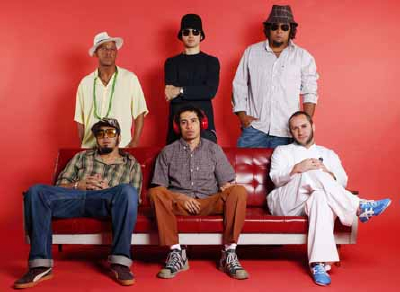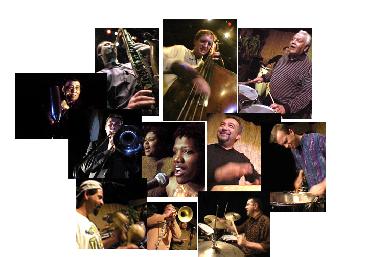CHICO SCIENCE & NACAO ZUMBI / “Maracatú Atômico”
Sometimes I find it amazing that I can know as much about music as I do and still be completely ignorant about what I’m listening to. Case in point, a lovely little tune called “Maracatú Atômico” which I first heard on Outro Lado, the debut album by the Brazilian/Dutch band Zuco 103.

I had no idea what the song was about and I didn’t know who wrote it or why. I just liked the way the off-kilter electronic drums set off the vibrant, glossy sound of lead singer Lillian Vieria’s voice. I also liked that, right at the end, in the midst of all of that high-speed tongue-twisting Portuguese I could clearly hear her say the song’s title, “maracatú atômico.” I used to sing that part along with Lillian: an insignificant but very entertaining bit of linguistic magic.
Eight years later, I know a lot more about the song. To start, it’s a cover. (I’d assumed it was a Zuco 103 original.) It was co-written in 1973 by Tom Mautner, a man who’s been described as a “poet, writer, violinist, pianist, songwriter, movie maker and singer” who wrote his first novel—the intriguingly titled The God of Rain and Death—when he was only 21 years old. The other co-writer of the enduring tune is Mautner’s partner, the guitarist and composer Nelson Jacobina.
The second thing I learned about “Maracatú Atômico” is that it's been covered many times, almost always by Brazilian artists. I don’t know who recorded it first, but the first hit version of the song was by Gilberto Gil from his 1974 double LP Cidade Do Salvador. (Actually, the Cidade LP was recorded back in '73 and '74 but was never released until 1999. In '74, Gil released "Maracatú" as a single.)

Compared to Zuco’s electro-funk with its hints of skitterish drum ‘n bass, Gil’s recording sounds downright traditional. But listen long enough to get Zuco’s pounding drums out of your mind and Gil’s song opens up, giving you all sorts of wonderful textures and sensations. For such a breezy, light-feeling record, it’s amazingly layered. Trying to listen down to the skeleton of it is like trying to peel your way to the heart of an onion using nothing but your imagination. Beneath Gil’s agile singing, there’s a subtle but persistent percussion war. All the while, the electric bass and the left side of the piano sound like they’re playing their own private game. There’s also a keyboard in there hitting infrequent, ominous-sounding chords. Gilberto Gil’s cover of “Maracatú” is one of those records that sounds merely pleasant at first, but keep on listening and you’ll find that its hooks sink deeper and deeper in.

Many years later, in 1996, the late Chico Science and his band Nação Zumbi put together another hit version “Maracatú Atômico.” Their record songs nothing like Gil’s. Where Gil was content to leave the fascinating polyrhythms of the record in the background, Chico and Co. bring them way, way upfront. At times, Chico’s voice is practically buried by the thumping, pounding and echoing of the various percussion effects. Although most of the drumming sounds synthetic, there’s something very alive and soulful about this record. It sounds like an excerpt from a wild street celebration as interpreted by wires and computer chips as opposed to human hands and animal skin.
After hearing the intensity and “streetness” of Chico’s version, I had to find out what the song is actually about. At All Brazilian Music, I came across a passage that put the ‘maracatu’ in historical context:
According to historian Leonardo Dantas, in order to coordinate the management of Africans brought to Brazil as slaves on the first half of the 16th century, Portuguese settlers encouraged the institution of black kings and queens protected by Catholic fraternities. The coronation pageants are believed to have originated maracatu’s frolic music. Slavery abolition (in 1888) caused the disappearance of the King of the Congo (Muchino Riá Congo) and the maracatus were turned into music groups, parading on holidays and in Carnival.It seems then, that Chico Science’s “Maracatú Atômico” sounds like street music at least in part because it is. And once again, we discover the ephemeral impulse of the African influence still at work. Chico is doing with computers and electronics the same thing that African slaves did the old-fashioned way some five hundred years previous.
The same website includes a simultaneously enlightening and baffling description of the maracatu rhythm as written by one Guera-Peixe, described in the article only as “a conductor”:
The snare drum announces a slight roll beat, intertwined with pauses. At about the same time, the gonguê (or agogô, a metalic, sharp percussion instrument) comes into the rhythm, preceding the war drums. The snare drum has then moved from the initial scheme to its variations when the zabumbas (bass drums) begin. Random and violent baques (synonym for bangs, which follow two mainlines in maracatu: the loose bang and the twisted bang) are added, as well as the repiques (tiny tambourine played with a small stick), increasing the intensity of the set.Well stated. I really can’t follow that.
What about the lyrics though? Glad you asked. It’s the usual fascinating and frustrating blend of Brazilian daydreaming and moralizing – earthy and restrained in tone, yet utterly fantastical. “Behind the skyscraper,” the song begins, “there's the sky.” And, “Above the umbrella, there’s the rain.” Later the lyrics talk about the flower inside of cauliflowers and gloves being left inside glove compartments and so on. Plus, it seems that the woman (or man?) who left the gloves left them at least in part because he or she is sporting a set of newly-sharpened, black-painted fingernails. Presumably, it makes more sense in the original Portuguese.
Get your versions of “Maracatú Atômico” here:
- Zuco 103’s version is from Outro Lado (Six Degrees, 2000).
- Gilberto Gil’s version is from Cidade Do Salvador (1974), which is only available as an expensive import; but it’s available on Pure Brazil: Samba Soul Groove, a great compilation of mostly classic-era Brazilian pop and soul.
- Likewise, Chico Science’s version is originally from his import-only album Afrociberdelia (Sony Intl, 1996); you can get it at a much more reasonable price on the excellent compilation Red Hot + Rio (Antilles/Verve, 1996).

• And last, I’m throwing in a Latin jazz version by bassist Glen Fisher and his band Con Alma; I’m not crazy about the sax work, but the piano is nice and the band swings; plus they’re from right here in San Diego, which I like. This one is from Con Alma As Is (Glen Fisher, 2000)
Ghana
In 1994 my wife, Nia, and I were in Ghana for Panafest. There was a program in a small outdoor stadium. The local (from around the immediate region) kings came in one after the other. The royalty were held aloft on palanquins that looked like a combination of small boats and rafts hoisted on the shoulders of able-bodied males and accompanied by drumming, singing and dancing. The drums were huge and lay atop the heads of their porters while a person with sticks walked behind hitting the drum head. I of course thought of Mardi Gras parades and Zulu Mardi Gras processions, etc.
As the royalty took their appointed places and everyone else clamored into the seats that were left (the reigning politicians had already gotten the choice spots), we guests were seated near what Americans would recognize as the fifty yard line. (That reference is only to give our readers some perspective and has nothing to do with the proceedings per se.)
As the last king came in there was a ruckus behind that krewe. What followed was an impromptu procession of street people. They had no king. Indeed, they had no drums. They beat on boxes, and logs, and cans, and sticks and bottles. And, oh how they danced. Heads high, feet flying. Mainly young and kicking up dust, some with their bare feet (literally—literally barefoot and literally raising small clouds of dust).
They entered the stadium. They marched all around the field and because they had no designated spot, when they completed the circled they danced back out, not bothering to stay for the speeches. About an hour and I don’t remember how many minutes later, I was sitting in the hot sun wishing I had gone with them.
Maracatú!
—Kalamu ya Salaam
Drum and dance
Good story, Baba. Seems like the street people always do their drum and dance thing, no matter if it's Panafest in Ghana, the maracatú in Brazil or the second line in New Orleans.
—Mtume ya Salaam
This entry was posted on Monday, June 9th, 2008 at 2:17 am and is filed under Cover. You can follow any responses to this entry through the RSS 2.0 feed. You can leave a response, or trackback from your own site.
One Response to “CHICO SCIENCE & NACAO ZUMBI / “Maracatú Atômico””
Leave a Reply
| top |